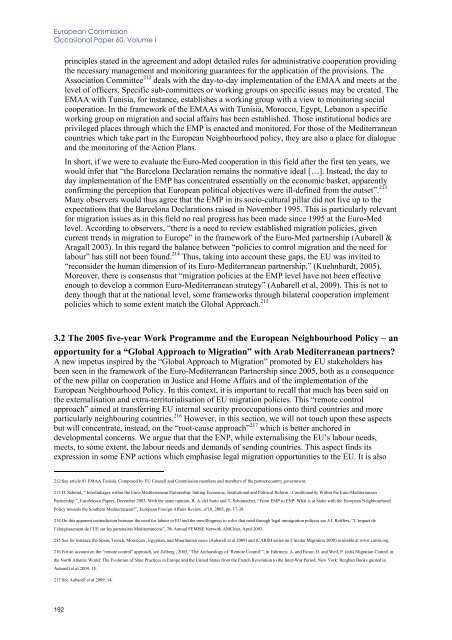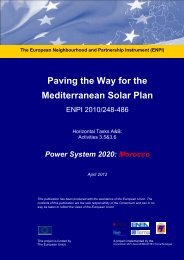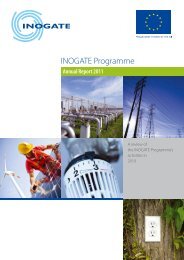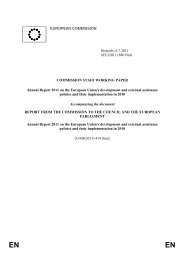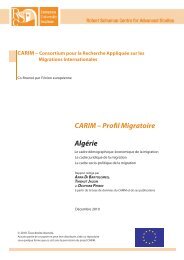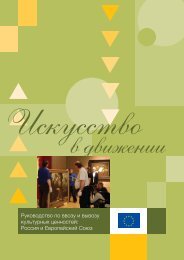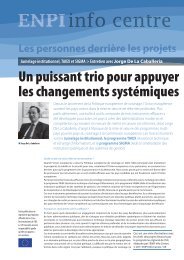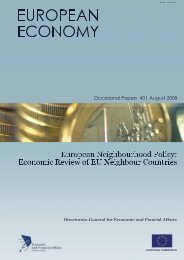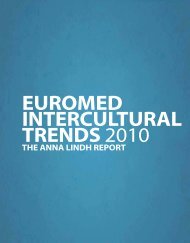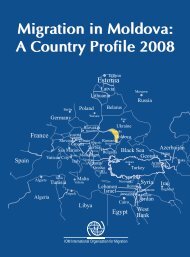<strong>European</strong> CommissionOccasional Paper 60, Volume Iprinciples stated in the agreement <strong>and</strong> adopt detailed rules for administrative cooperation providingthe necessary management <strong>and</strong> monitoring guarantees for the application of the provisions. TheAssociation Committee 212 deals with the day-to-day implementation of the EMAA <strong>and</strong> meets at thelevel of officers. Specific sub-committees or working groups on specific issues may be created. TheEMAA with Tunisia, for instance, establishes a working group with a view to monitoring socialcooperation. In the framework of the EMAAs with Tunisia, Morocco, Egypt, Lebanon a specificworking group on <strong>migration</strong> <strong>and</strong> social affairs has been established. Those institutional bodies areprivileged places through which the EMP is enacted <strong>and</strong> monitored. For those of the Mediterraneancountries which take part in the <strong>European</strong> Neighbourhood policy, they are also a place for dialogue<strong>and</strong> the monitoring of the Action Plans.In short, if we were to evaluate the Euro-Med cooperation in this field after the first ten years, wewould infer that “the Barcelona Declaration remains the normative ideal […]. Instead, the day today implementation of the EMP has concentrated essentially on the economic basket, apparentlyconfirming the perception that <strong>European</strong> political objectives were ill-defined from the outset”. 213Many observers would thus agree that the EMP in its socio-cultural pillar did not live up to theexpectations that the Barcelona Declarations raised in November 1995. This is particularly relevantfor <strong>migration</strong> issues as in this field no real progress has been made since 1995 at the Euro-Medlevel. According to observers, “there is a need to review established <strong>migration</strong> policies, givencurrent trends in <strong>migration</strong> to Europe” in the framework of the Euro-Med partnership (Aubarell &Aragall 2003). In this regard the balance between “policies to control <strong>migration</strong> <strong>and</strong> the need forlabour” has still not been found. 214 Thus, taking into account these gaps, the EU was invited to“reconsider the human dimension of its Euro-Mediterranean partnership.” (Kuehnhardt, 2005).Moreover, there is consensus that “<strong>migration</strong> policies at the EMP level have not been effectiveenough to develop a common Euro-Mediterranean strategy” (Aubarell et al, 2009). This is not todeny though that at the national level, some frameworks through bilateral cooperation implementpolicies which to some extent match the Global Approach. 2153.2 The 2005 five-year Work Programme <strong>and</strong> the <strong>European</strong> Neighbourhood Policy – anopportunity for a “Global Approach to Migration” with Arab Mediterranean partners?A new impetus inspired by the “Global Approach to Migration” promoted by EU stakeholders hasbeen seen in the framework of the Euro-Mediterranean Partnership since 2005, both as a consequenceof the new pillar on cooperation in Justice <strong>and</strong> Home Affairs <strong>and</strong> of the implementation of the<strong>European</strong> Neighbourhood Policy. In this context, it is important to recall that much has been said onthe externalisation <strong>and</strong> extra-territorialisation of EU <strong>migration</strong> policies. This “remote controlapproach” aimed at transferring EU internal security preoccupations onto third countries <strong>and</strong> moreparticularly neighbouring countries. 216 However, in this section, we will not touch upon these aspectsbut will concentrate, instead, on the “root-cause approach” 217 which is better anchored indevelopmental concerns. We argue that that the ENP, while externalising the EU’s labour needs,meets, to some extent, the labour needs <strong>and</strong> dem<strong>and</strong>s of sending countries. This aspect finds itsexpression in some ENP actions which emphasise legal <strong>migration</strong> opportunities to the EU. It is also212 See article 81 EMAA Tunisia. Composed by EU Council <strong>and</strong> Commission members <strong>and</strong> members of the partner country government.213 D. Schmid, “ Interlinkages within the Euro-Mediterranean Partnership: linking Economic, Institutional <strong>and</strong> Political Reform : Conditionality Within the Euro-MediterraneanPartnership ”, EuroMesco Papers, December 2003. With the same opinion, R. A. del Sarto <strong>and</strong> T. Schumacher, “From EMP to ENP: What is at Stake with the <strong>European</strong> NeighbourhoodPolicy towards the Southern Mediterranean?”, <strong>European</strong> Foreign Affairs Review, n°10, 2005, pp. 17-38.214 On this apparent contradiction between the need for labour in EU <strong>and</strong> the unwillingness to solve that need through legal im<strong>migration</strong> policies see J-L Reiffers, “L’impact del’élargisssement de l’UE sur les partenaires Méditerranéens”, 7th Annual FEMISE Network AMCinar, April 2003.215 See for instance the Spain, French, Moroccan , Egyptian, <strong>and</strong> Mauritanian cases (Aubarell et al 2009) <strong>and</strong> (CARIM series on Circular Migration 2008) available at www.carim.org.216 For an account on the “remote control” approach, see Zolberg , 2003, “The Archaeology of ‘Remote Control’”, in Fahrmeir, A. <strong>and</strong> Faron, O. <strong>and</strong> Weil, P. (eds) Migration Control inthe North Atlantic World: The Evolution of State Practices in Europe <strong>and</strong> the United States from the French Revolution to the Inter-War Period. New York: Berghan Books quoted inAubarell et al 2009, 14.217 See Aubarell et al 2009, 14.192
Chapter IIIEU Migration Policy towards Arab Mediterranean Countries <strong>and</strong> its Impact on their <strong>Labour</strong> Marketsthere in the EMP five-year program which acknowledges that “Migration, Social Integration, Justice<strong>and</strong> Security are issues of common interest in the Partnership, <strong>and</strong> should be addressed through acomprehensive <strong>and</strong> integrated approach,” <strong>and</strong> emphasises that the Euro-Mediterranean partnershipwill enhance co-operation by promoting legal <strong>migration</strong> opportunities <strong>and</strong> facilitating the legalmovement of individuals as important factors aiming at encouraging economic growth <strong>and</strong> improvingcooperative channels between countries.3.2.1 The Five-Year Work Programme: A new approach at a multilateral levelThe Five Year Work Programme of the Barcelona Summit (28 November 2005) called for enhancedcooperation in the fields of Migration, Social Integration, Justice <strong>and</strong> Security through acomprehensive <strong>and</strong> integrated approach.This chapter contains 6 objectives:a) Promote legal <strong>migration</strong> opportunities: the facilitation of the legal movement of individuals,recognising that these constitute an opportunity for economic growth; the fair treatment <strong>and</strong>integration policies for legal migrants; <strong>and</strong> the facilitation of the flow of remittance transfers<strong>and</strong> an attempt to deal with “brain drain”);b) Reduce significantly the level of illegal <strong>migration</strong> (trafficking in human beings <strong>and</strong> loss oflife through hazardous sea <strong>and</strong> border crossings);c) Pursue the modernisation <strong>and</strong> efficiency of the administration of justice <strong>and</strong> facilitate accessto justice by citizens;d) Reinforce judicial cooperation (including on cross-border issues);e) Facilitate solutions to problems arising from mixed-marriage disputes <strong>and</strong> child-custody cases<strong>and</strong> encourage cooperation in accordance with the principle of the UN Convention of 1989on the Rights of the Child <strong>and</strong> national legislation;f) Promote the ratification <strong>and</strong> further implementation of the relevant UN conventions oncombating organised crime <strong>and</strong> drugs, <strong>and</strong> improve cooperation by law enforcementagencies.To contribute to these objectives, it was decided to:a) Hold a Ministerial meeting to discuss all issues pertinent to <strong>migration</strong>;b) Develop mechanisms for practical cooperation <strong>and</strong> sharing experiences on managing<strong>migration</strong> <strong>flows</strong> humanely, (deepen dialogue with countries of origin <strong>and</strong> transit <strong>and</strong> exploreoptions for providing assistance for countries of origin <strong>and</strong> transit);c) Promote schemes for safer, easier, less expensive channels for the efficient transfer ofmigrants’ remittances;d) Develop ways to assist capacity building for those national institutions in partner countriesdealing with expatriates;e) Promote legal <strong>migration</strong> opportunities <strong>and</strong> integration of migrants;f) Enhance cooperation to fight illegal <strong>migration</strong>. This cooperation should involve all aspects ofillegal <strong>migration</strong>, such as the negotiation of different kinds of readmission agreements, thefight against human trafficking <strong>and</strong> related networks as well as other forms of illegal<strong>migration</strong>, <strong>and</strong> capacity building in border management <strong>and</strong> <strong>migration</strong>;g) Develop contacts, training <strong>and</strong> technical assistance for judicial <strong>and</strong> legal professionals,building on the EuroMed Justice Programme;h) Develop contacts, training <strong>and</strong> technical assistance for police <strong>and</strong> law-enforcement officers,building on ENP Action Plans <strong>and</strong> the EuroMed Police Programme, encouraging networks inthe EuroMed region <strong>and</strong> drawing on the expertise of Europol.193
- Page 5 and 6:
STUDYLABOUR MARKETS PERFORMANCE AND
- Page 7 and 8:
Table of ContentsLABOUR MARKETS PER
- Page 10:
8.1 Actual migration and consumptio
- Page 15 and 16:
Chapter IFinal Report 15 MILLION NE
- Page 17 and 18:
Chapter IFinal Report …so that MI
- Page 19 and 20:
Chapter IFinal Reportroots). The cu
- Page 21 and 22:
Chapter IFinal Report In AMCs, REMI
- Page 23 and 24:
Chapter IFinal Reportpolicies. This
- Page 25 and 26:
Chapter IFinal ReportMediterranean
- Page 27 and 28:
Chapter IFinal ReportMore recently,
- Page 29 and 30:
Chapter IFinal Reportfor EU employm
- Page 31 and 32:
Chapter IFinal Reportchosen, these
- Page 33 and 34:
Chapter IFinal Reportexit of women
- Page 35 and 36:
Chapter IFinal ReportFigure 1.2.1.
- Page 37 and 38:
Chapter IFinal ReportA Declining Em
- Page 39 and 40:
Chapter IFinal ReportThe same year,
- Page 41 and 42:
Chapter IFinal ReportTable 2.2.1. I
- Page 43 and 44:
Chapter IFinal Reportminimum wages
- Page 45 and 46:
Chapter IFinal Report2.4 Unemployme
- Page 47 and 48:
Chapter IFinal ReportYouth Unemploy
- Page 49 and 50:
Chapter IFinal ReportBut one should
- Page 51 and 52:
Chapter IFinal Reportmillion) 10 .
- Page 53 and 54:
Chapter IFinal Reportmight intensif
- Page 55 and 56:
Chapter IFinal Reporttrue labour ma
- Page 57 and 58:
Chapter IFinal Reportto reform the
- Page 59 and 60:
Chapter IFinal ReportFrom a differe
- Page 61 and 62:
Chapter IFinal ReportTable 4.2.1 Ou
- Page 63 and 64:
Chapter IFinal ReportSource: Adams
- Page 65 and 66:
Chapter IFinal Reportin the destina
- Page 67 and 68:
Chapter IFinal ReportIn conclusion,
- Page 69 and 70:
Chapter IFinal Reportorganised in B
- Page 71 and 72:
Chapter IFinal Reportsecond Intifad
- Page 73 and 74:
Chapter IFinal Reportstands at 29.7
- Page 75 and 76:
Chapter IFinal Reportconstruction w
- Page 77 and 78:
Chapter IFinal ReportAs far as the
- Page 79 and 80:
Chapter IFinal Reportother cases, l
- Page 81 and 82:
Chapter IFinal Reportunemployment a
- Page 83 and 84:
Chapter IFinal Reportof Egypt, so f
- Page 85 and 86:
Chapter IFinal ReportWhile progress
- Page 87 and 88:
Chapter IFinal ReportThese reservat
- Page 89 and 90:
Chapter IFinal ReportAs Figure 6.3.
- Page 91 and 92:
Chapter IFinal Reportin skill devel
- Page 93 and 94:
Chapter IFinal ReportThe Directive
- Page 95 and 96:
Chapter IFinal ReportThe need for
- Page 97 and 98:
Chapter IFinal Reportobjectives are
- Page 99 and 100:
Chapter IFinal Reporttrue Euro-Medi
- Page 101 and 102:
Chapter IFinal Report- Putting empl
- Page 103 and 104:
Chapter IFinal Report promotion of
- Page 105 and 106:
Chapter IFinal ReportOtherADAMS, R.
- Page 107 and 108:
Chapter IFinal ReportDE BEL-AIR, F.
- Page 109 and 110:
Chapter IFinal ReportGUPTA, S., C.
- Page 111 and 112:
Chapter IFinal ReportOECD (2000): M
- Page 113 and 114:
Chapter II - Thematic Background Pa
- Page 115 and 116:
Chapter IIThe impact of migration o
- Page 117 and 118:
Chapter IIThe impact of migration o
- Page 119 and 120:
Chapter IIThe impact of migration o
- Page 121 and 122:
Chapter IIThe impact of migration o
- Page 123 and 124:
Chapter IIThe impact of migration o
- Page 125 and 126:
Chapter IIThe impact of migration o
- Page 127 and 128:
Chapter IIThe impact of migration o
- Page 129 and 130:
Chapter IIThe impact of migration o
- Page 131 and 132:
Chapter IIThe impact of migration o
- Page 133 and 134:
Chapter IIThe impact of migration o
- Page 135 and 136:
Chapter IIThe impact of migration o
- Page 137 and 138:
Chapter IIThe impact of migration o
- Page 139 and 140:
Chapter IIThe impact of migration o
- Page 141 and 142:
Chapter IIThe impact of migration o
- Page 143 and 144: Chapter IIThe impact of migration o
- Page 145 and 146: Chapter IIThe impact of migration o
- Page 147 and 148: Chapter IIThe impact of migration o
- Page 149 and 150: Chapter IIThe impact of migration o
- Page 151 and 152: Chapter IIThe impact of migration o
- Page 153 and 154: Chapter IIThe impact of migration o
- Page 155 and 156: Chapter IIThe impact of migration o
- Page 157 and 158: Chapter IIThe impact of migration o
- Page 159 and 160: Chapter IIThe impact of migration o
- Page 161 and 162: Chapter III - Thematic Background P
- Page 163 and 164: Chapter IIIEU Migration Policy towa
- Page 165 and 166: Chapter IIIEU Migration Policy towa
- Page 167 and 168: Chapter IIIEU Migration Policy towa
- Page 169 and 170: Chapter IIIEU Migration Policy towa
- Page 171 and 172: Chapter IIIEU Migration Policy towa
- Page 173 and 174: Chapter IIIEU Migration Policy towa
- Page 175 and 176: Chapter IIIEU Migration Policy towa
- Page 177 and 178: Chapter IIIEU Migration Policy towa
- Page 179 and 180: Chapter IIIEU Migration Policy towa
- Page 181 and 182: Chapter IIIEU Migration Policy towa
- Page 183 and 184: Chapter IIIEU Migration Policy towa
- Page 185 and 186: Chapter IIIEU Migration Policy towa
- Page 187 and 188: Chapter IIIEU Migration Policy towa
- Page 189 and 190: Chapter IIIEU Migration Policy towa
- Page 191 and 192: Chapter IIIEU Migration Policy towa
- Page 193: Chapter IIIEU Migration Policy towa
- Page 197 and 198: Chapter IIIEU Migration Policy towa
- Page 199 and 200: Chapter IIIEU Migration Policy towa
- Page 201 and 202: Chapter IIIEU Migration Policy towa
- Page 203 and 204: Chapter IIIEU Migration Policy towa
- Page 205 and 206: Chapter IIIEU Migration Policy towa
- Page 207: Chapter IIIEU Migration Policy towa


